Abstract
Mice infected with the erythrocytic stages of Plasmodium berghei show an impaired host response to immunization with irradiated sporozoites of the same malarial parasite. The stage-specific anti-sporozoite response was measured by indirect immunofluorescence upon adsorption of the sera with parasitized red blood cells. P. berghei-infected mice, immunized with irradiated sporozoites on the fourth day of a blood-induced malaria infection, developed a normal anti-sporozoite antibody response. However, this antibody response was more short-lived compared with the antibody response in normal mice immunized with a similar dose of irradiated sporozoites. The immune response was severely depressed when the animals were immunized on day 7 or later after malaria infection. None of the sporozoite-immunized animals, including those which responded to the first immunization, developed a secondary antibody response on reinoculation with irradiated sporozoites. A fully established anti-sporozoite immune response, obtained after multiple immunizations with irradiated sporozoites and which resulted in stage-specific protection of the animals, was not affected by a superimposed blood stage malaria infection. The titres of the anti-sporozoite antibodies in these animals were unaltered, in spite of their high parasitaemias. Reduction of the malaria parasitaemia by chloroquine treatment abolished the immunosuppressive effects of the disease.
These observations are discussed in relation to anti-sporozite immunity and immunosuppression in man in malaria endemic areas.
Full text
PDF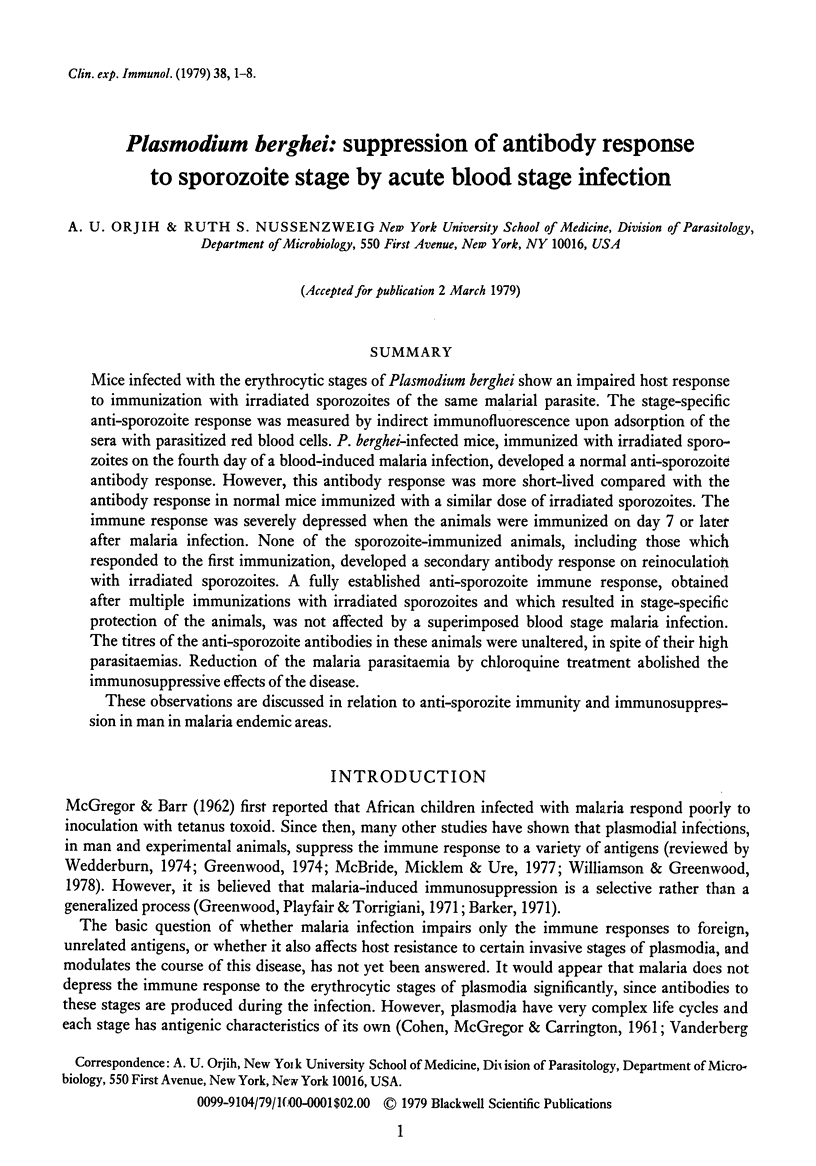
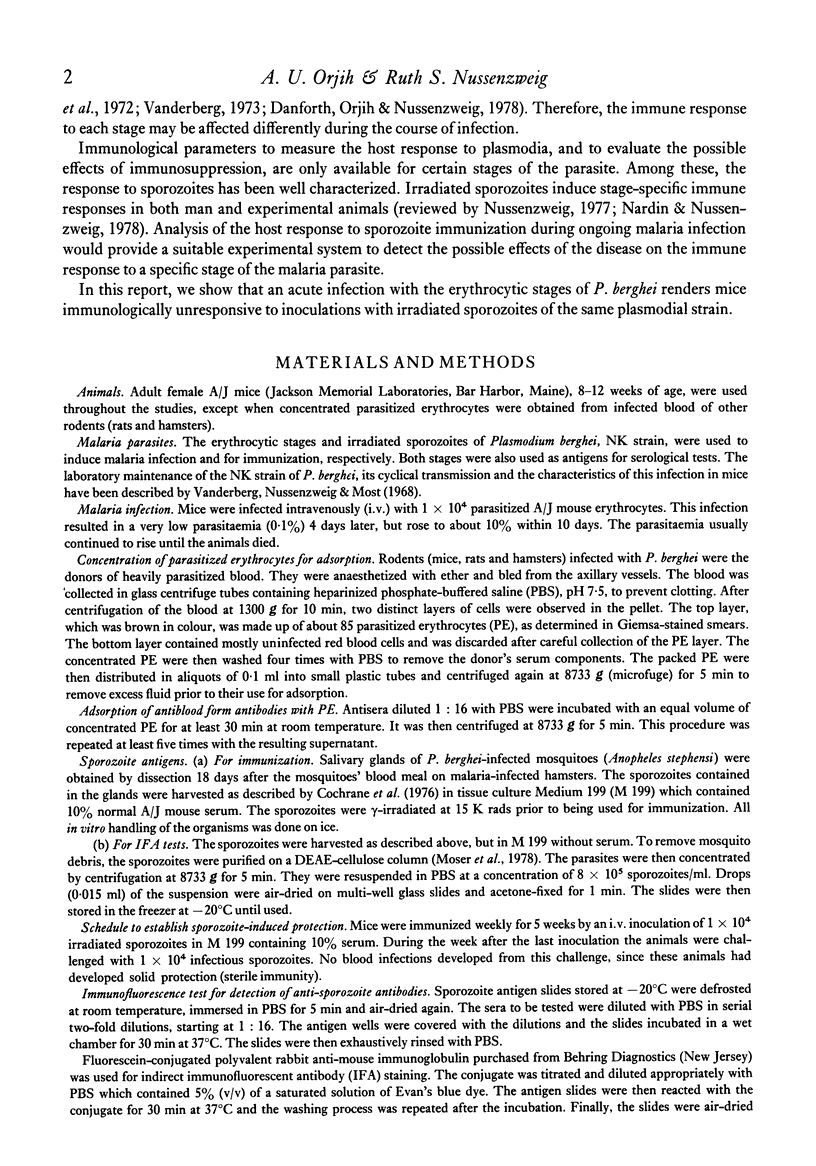
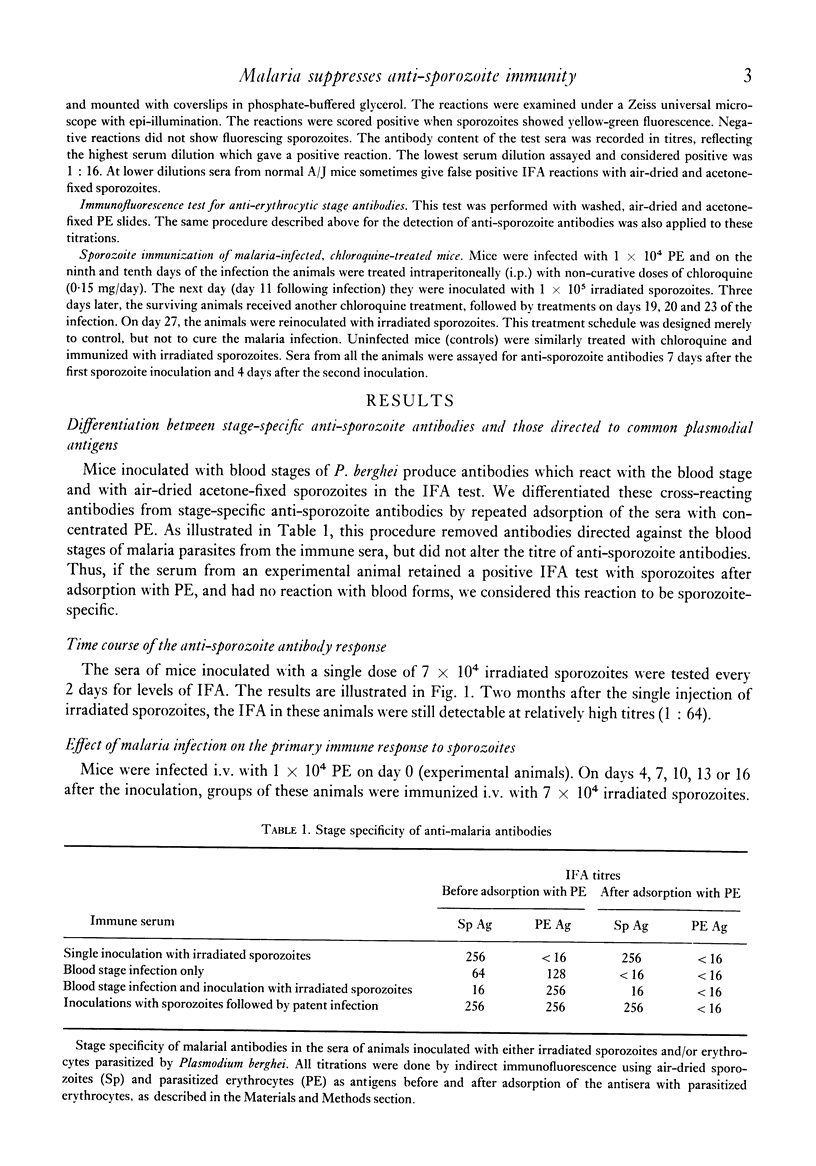
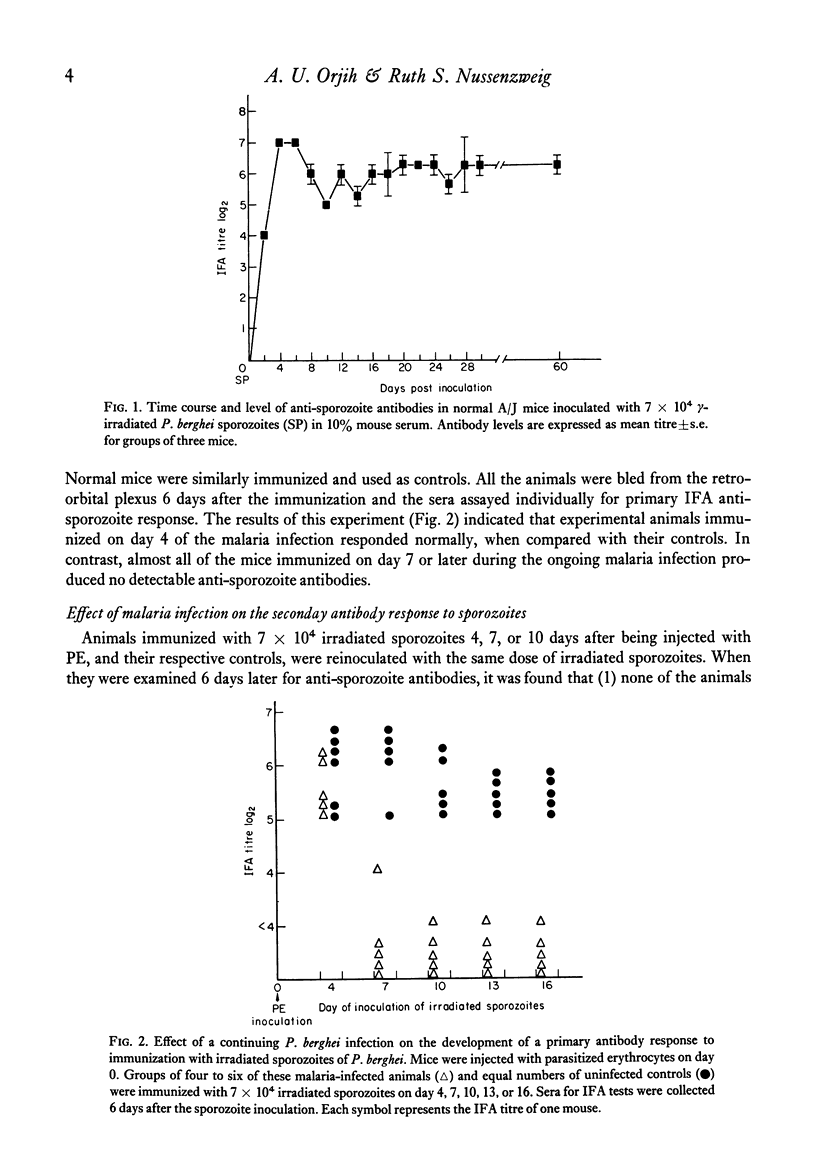
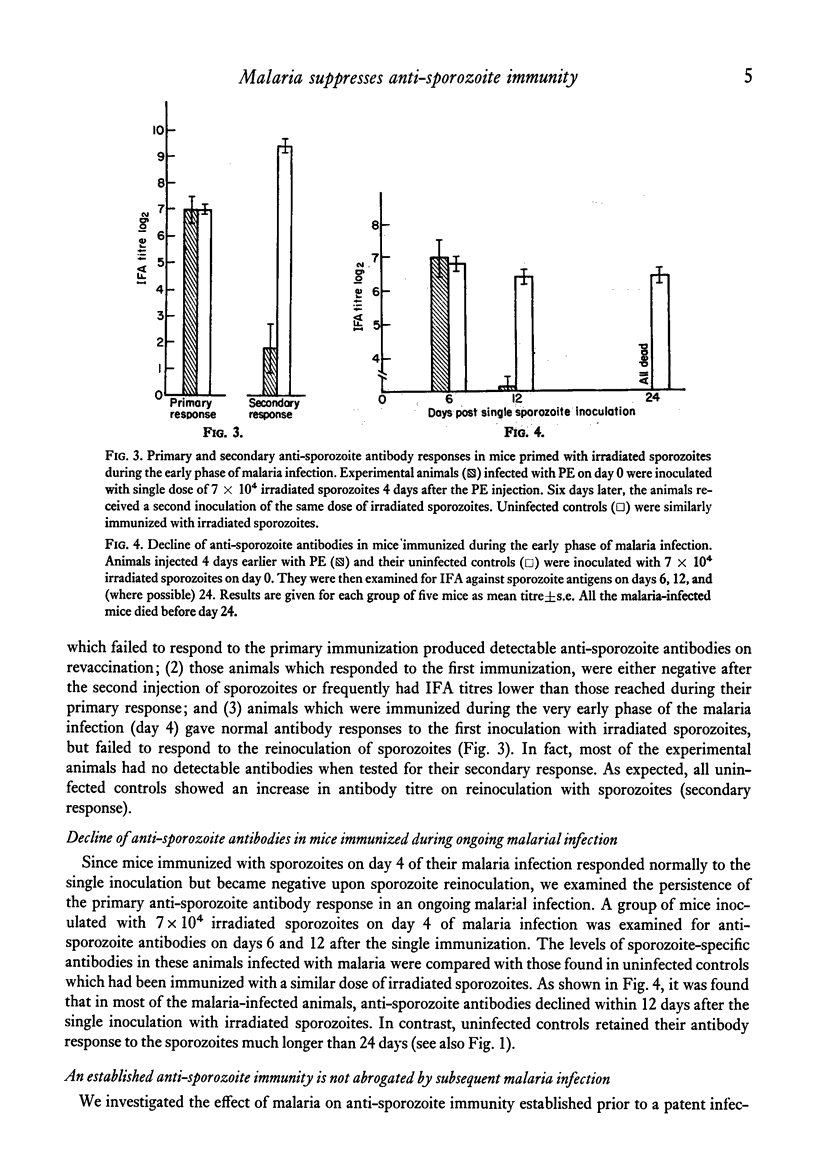
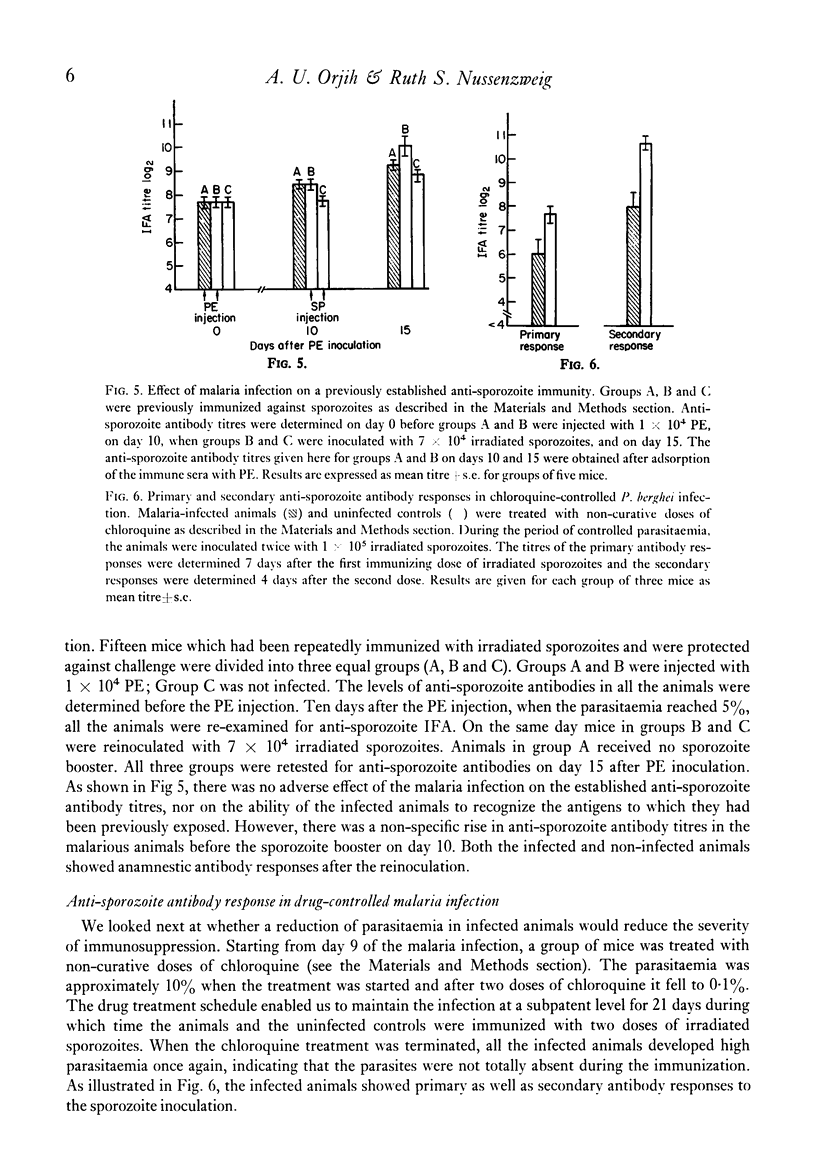
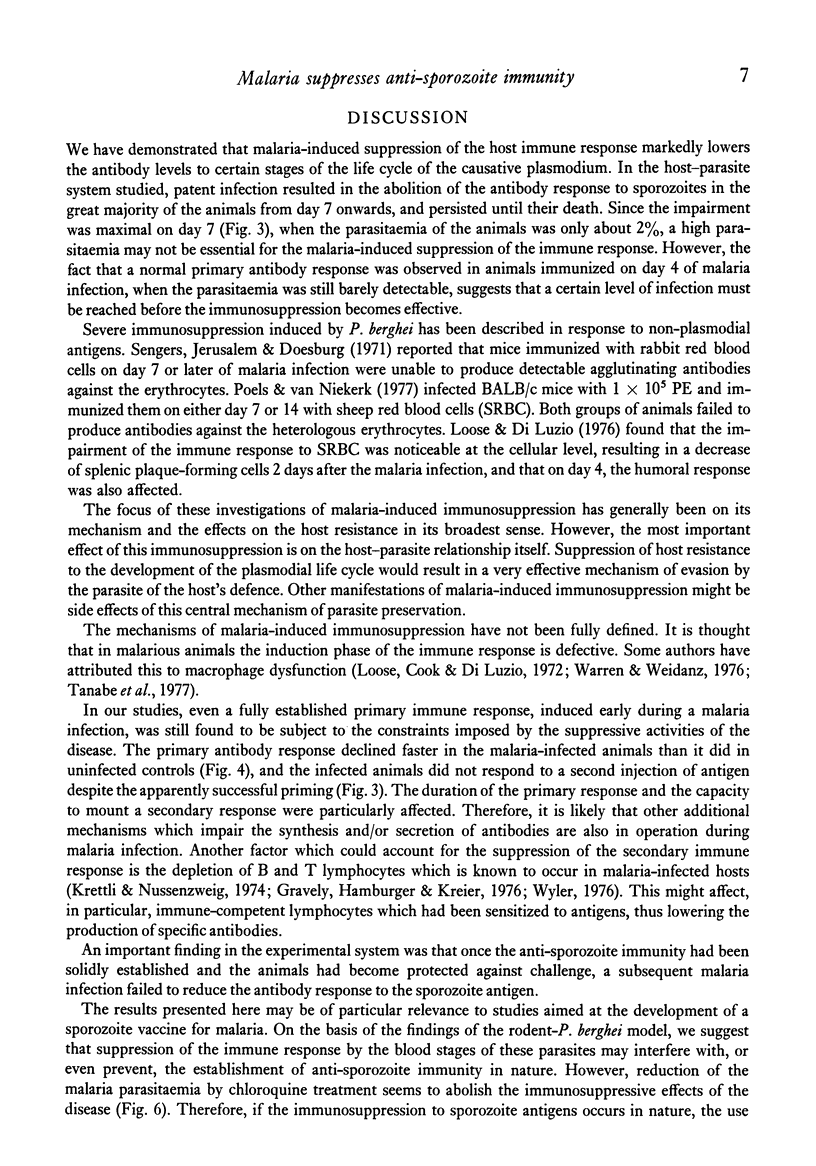
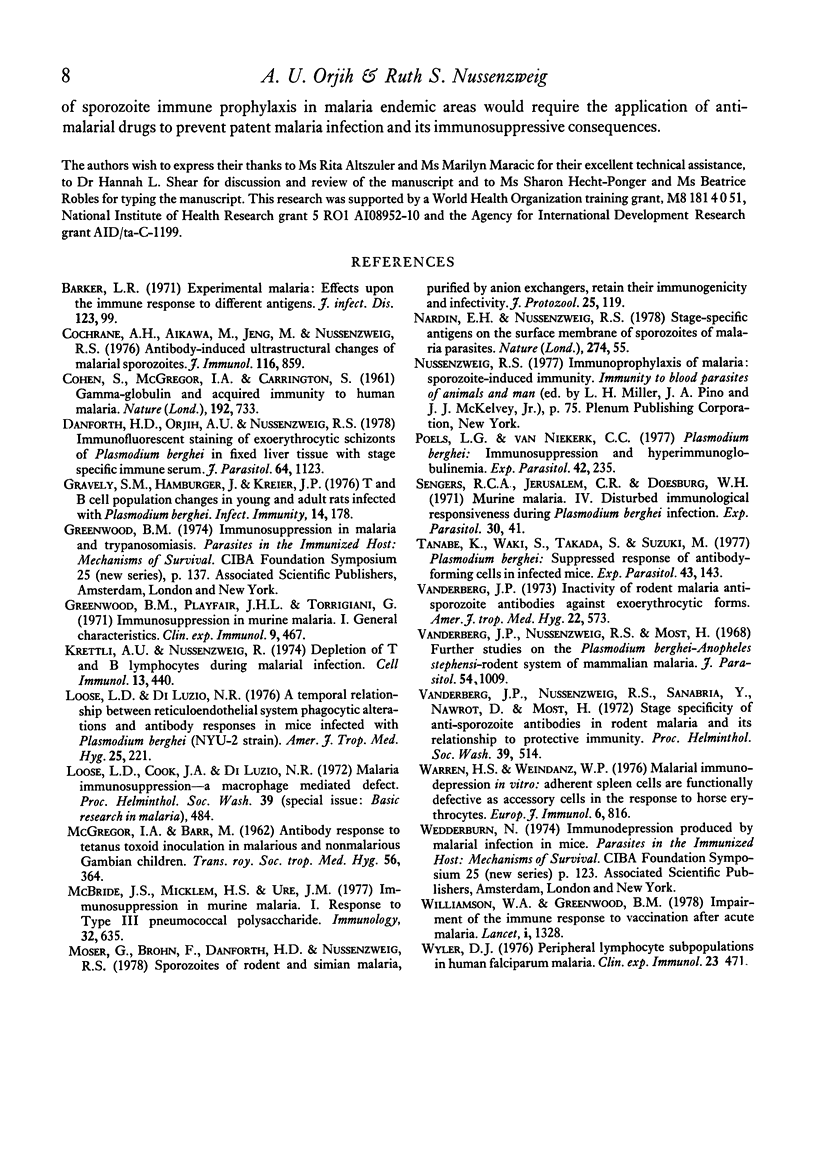
Selected References
These references are in PubMed. This may not be the complete list of references from this article.
- Barker L. R. Experimental malaria: effects upon the immune response to different antigens. J Infect Dis. 1971 Jan;123(1):99–101. doi: 10.1093/infdis/123.1.99. [DOI] [PubMed] [Google Scholar]
- COHEN S., McGREGOR I. A., CARRINGTON S. Gamma-globulin and acquired immunity to human malaria. Nature. 1961 Nov 25;192:733–737. doi: 10.1038/192733a0. [DOI] [PubMed] [Google Scholar]
- Cochrane A. H., Aikawa M., Jeng M., Nussenzweig R. S. Antibody-induced ultrastructural changes of malarial sporozoites. J Immunol. 1976 Mar;116(3):859–867. [PubMed] [Google Scholar]
- Danforth H. D., Orjih A. U., Nussenzweig R. S. Immunofluorescent staining of exoerythrocytic schizonts of Plasmodium berghei in fixed liver tissue with stage-specific immune serum. J Parasitol. 1978 Dec;64(6):1123–1125. [PubMed] [Google Scholar]
- Gravely S. M., Hamburger J., Kreier J. P. T and B cell population changes in young and in adult rats infected with Plasmodium berghei. Infect Immun. 1976 Jul;14(1):178–183. doi: 10.1128/iai.14.1.178-183.1976. [DOI] [PMC free article] [PubMed] [Google Scholar]
- Greenwood B. M., Playfair J. H., Torrigiani G. Immunosuppression in murine malaria. I. General characteristics. Clin Exp Immunol. 1971 Mar;8(3):467–478. [PMC free article] [PubMed] [Google Scholar]
- Krettli A. U., Nussenzweig R. Depletion of T and B lymphocytes during malarial infections. Cell Immunol. 1974 Sep;13(3):440–446. doi: 10.1016/0008-8749(74)90263-9. [DOI] [PubMed] [Google Scholar]
- Loose L. D., di Luzio N. R. A temporal relationship between reticuloendothelial system phagocytic alterations and antibody responses in mice infected with Plasmodium berghei (NYU-2 strain). Am J Trop Med Hyg. 1976 Mar;25(2):221–228. doi: 10.4269/ajtmh.1976.25.221. [DOI] [PubMed] [Google Scholar]
- McBride J. S., Micklem H. S., Ure J. M. Immunosuppression in murine malaria. I. Response to type III pneumococcal polysaccharide. Immunology. 1977 May;32(5):635–644. [PMC free article] [PubMed] [Google Scholar]
- Moser G., Brohn F. H., Danforth H. D., Nussenzweig R. S. Sporozoites of rodent and simian malaria, purified by anion exchangers, retain their immunogenicity and infectivity. J Protozool. 1978 Feb;25(1):119–124. doi: 10.1111/j.1550-7408.1978.tb03881.x. [DOI] [PubMed] [Google Scholar]
- Nardin E. H., Nussenzweig R. S. Stage-specific antigens on the surface membrane of sporozoites of malaria parasites. Nature. 1978 Jul 6;274(5666):55–57. doi: 10.1038/274055a0. [DOI] [PubMed] [Google Scholar]
- Poels L. G., van Niekerk C. C. Plasmodium berghei: immunosuppression and hyperimmunoglobulinemia. Exp Parasitol. 1977 Jun;42(1):235–247. doi: 10.1016/0014-4894(77)90081-9. [DOI] [PubMed] [Google Scholar]
- Sengers R. C., Jerusalem C. R., Doesburg W. H. Murine malaria. IV. Disturbed immunological responsiveness during Plasmodium berghei infection. Exp Parasitol. 1971 Aug;30(1):41–53. doi: 10.1016/0014-4894(71)90068-3. [DOI] [PubMed] [Google Scholar]
- Tanabe K., Waki S., Takada S., Suzuki M. Plasmodium berghei: suppressed response of antibody-forming cells in infected mice. Exp Parasitol. 1977 Oct;43(1):143–152. doi: 10.1016/0014-4894(77)90017-0. [DOI] [PubMed] [Google Scholar]
- Vanderberg J. P. Inactivity of rodent malaria anti-sporozoite antibodies against exoerythrocytic forms. Am J Trop Med Hyg. 1973 Sep;22(5):573–577. doi: 10.4269/ajtmh.1973.22.573. [DOI] [PubMed] [Google Scholar]
- Vanderberg J. P., Nussenzweig R. S., Most H. Further studies on the Plasmodium berghei-Anopheles stephensi--rodent system of mammalian malaria. J Parasitol. 1968 Oct;54(5):1009–1016. [PubMed] [Google Scholar]
- Warren H. S., Weidanz W. P. Malarial immunodepression in vitro: adherent spleen cells are functionally defective as accessory cells in the response to horse erythrocytes. Eur J Immunol. 1976 Nov;6(11):816–819. doi: 10.1002/eji.1830061112. [DOI] [PubMed] [Google Scholar]
- Williamson W. A., Greenwood B. M. Impairment of the immune response to vaccination after acute malaria. Lancet. 1978 Jun 24;1(8078):1328–1329. doi: 10.1016/s0140-6736(78)92403-0. [DOI] [PubMed] [Google Scholar]
- Wyler D. J. Peripheral lymphocyte subpopulations in human falciparum malaria. Clin Exp Immunol. 1976 Mar;23(3):471–476. [PMC free article] [PubMed] [Google Scholar]


